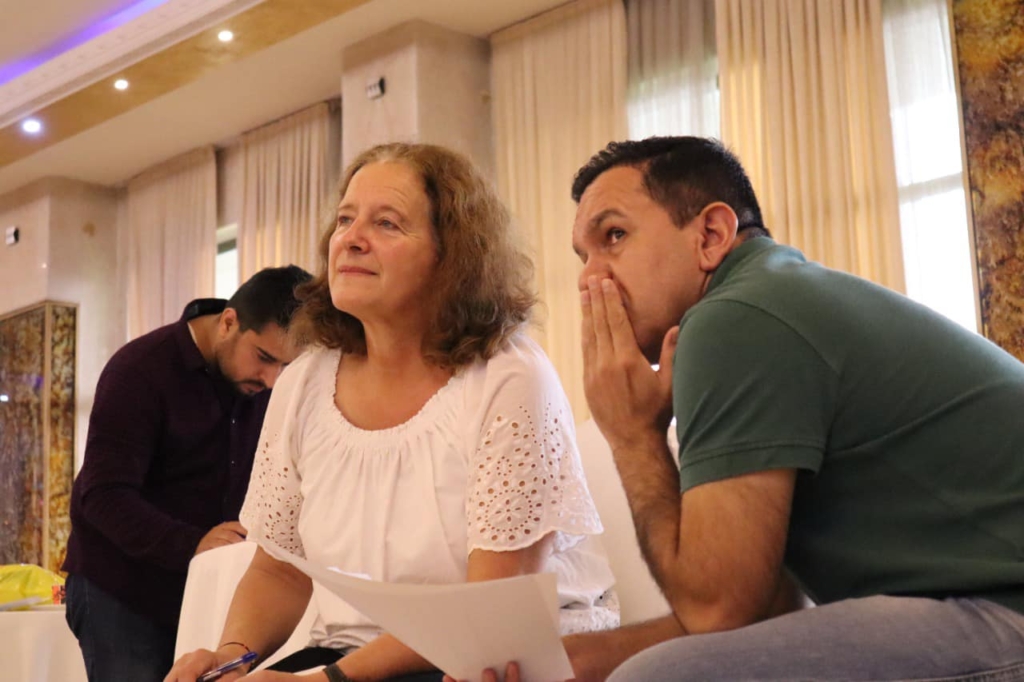Salam Omer is a highly accomplished journalist and media trainer from Iraq, with vast experience from both media and the business sector. Omer is dedicated to promoting dialogue and peace in Iraq’s disputed territories, incorporating the methodology of the Nansen Center for Peace and Dialogue into his work as an editor-in chief at the news agency KirkukNow.
With unwavering determination, he highlights the importance of safety, access to information, and financial sustainability in this treacherous terrain.
– Safety is paramount for us, both in the field and online, Omer explains.
Working in a challenging and volatile environment, journalists must navigate through conflicting parties, ensuring their well-being while pursuing the truth. Omer’s experience and understanding of safety and security protocols in dealing with warring factions have been instrumental in his reporting efforts.
– It’s very difficult to get access to the right sources, he laments.
Yet, Omer perseveres, determined to provide reliable and unbiased reporting despite the obstacles that obstruct the path to information.
To amplify the voices of the unheard
Financial sustainability poses an additional challenge in conflict zones. With little development and militias controlling various aspects of daily life, finding core support becomes an arduous task. Omer acknowledges the precarious nature of his profession, stating:
– Nothing is guaranteed where I work, except my persistence to continue serving local communities with fact-based news and information.
While the Iraqi constitution enshrines freedom of the press, Omer observes a lack of understanding from the government regarding journalism’s vital role in marginalized communities. He believes that journalism can amplify the voices of the unheard, fostering dialogue and societal change. Inspired by the potential to bridge divides and promote understanding, Omer finds purpose in pursuing war and peace issues through dialogue.

A transformative process
Recently, Omer participated in the Nansen Center for Peace and Dialogue’s seminar on dilemmas in war and peace. According to him, initiatives like these offers a unique opportunity for journalists to broaden their perspectives and gain new insights. He emphasizes the transformative impact it had on his understanding of the challenges he faces.
For him, the seminar served as a catalyst to enhance his reporting practices and reaffirm his commitment to responsible journalism. Engaging with a diverse range of participants from around the world, Omer was inspired by the shared insights and experiences.
– The seminar provided a platform for us to talk and network, he explains.
This collaborative environment allowed him to recognize that he is not alone in his struggle to report from conflict zones and that there are others facing similar harsh conditions.
From conflict reporting to dialogue journalism
Notable speakers and experts at the seminar offered invaluable contributions, shedding light on war and peace dilemmas. Omer was particularly moved by the experiences shared by peace practitioners, who revealed the unimaginably tricky challenges they encounter while receiving minimal support. Their stories reinforced Omer’s belief in the power of reliable news and information in promoting peace during times of war. He adds:
– I’ve come out with the feeling that I am not alone. The participants also live in harsh conditions and they were a huge source of inspiration. I will continue build a bigger network to conceptualize how producing reliable information can contribute to promote peace in times of war.
The seminar’s impact on Omer’s work is evident in his commitment to building a larger network and conceptualizing ways to utilize media as a tool for peace promotion. Inspired by the participants, he seeks to produce accurate and verified journalism, empowering underprivileged and marginalized groups to engage in dialogue with others.
Omer’s dedication to debunking misinformation and disinformation, and his emphasis on countering biases, demonstrates his conviction in the potential of journalism to shape narratives and foster reconciliation.
I’ve come out with the feeling that I am not alone.
Salam Omer

Journalism as a bridge over troubled water
The seminar’s practical recommendations and strategies resonated deeply with Omer. Exploring various approaches, such as increasing the production of news and information related to peacebuilding, has opened new horizons for him.
Omer now envisions future projects in collaboration with the Nansen Center for Peace and Dialogue that focus on reliable news, information, and researching the information consumed by conflicting parties. By fostering a constructive dialogue, he aims to create an environment where peace can flourish.
Salam Omer’s journey as a journalist reporting from conflict zones reflects the unwavering pursuit of truth amidst adversity. His experiences and challenges underscore the critical importance of safety, access to information, and financial sustainability in conflict reporting.
The seminar on dilemmas in war and peace served as a transformative experience, amplifying Omer’s dedication to responsible journalism and the power of reliable information in promoting peace. By embracing dialogue journalism and seeking to bridge divides, he embodies the potential for media to shape narratives, foster reconciliation, and contribute to building a peaceful society in post-conflict regions.

